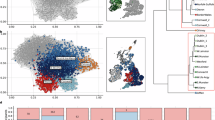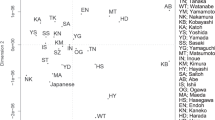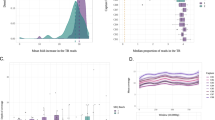Abstract
In most societies, surnames are passed down from fathers to sons, just like the Y chromosome. It follows that, theoretically, men sharing the same surnames would also be expected to share related Y chromosomes. Previous investigations have explored such relationships, but so far, the only detailed studies that have been conducted are on samples from the British Isles. In order to provide additional insights into the correlation between surnames and Y chromosomes, we focused on the Spanish population by analysing Y chromosomes from 2121 male volunteers representing 37 surnames. The results suggest that the degree of coancestry within Spanish surnames is highly dependent on surname frequency, in overall agreement with British but not Irish surname studies. Furthermore, a reanalysis of comparative data for all three populations showed that Irish surnames have much greater and older surname descent clusters than Spanish and British ones, suggesting that Irish surnames may have considerably earlier origins than Spanish or British ones. Overall, despite closer geographical ties between Ireland and Britain, our analysis points to substantial similarities in surname origin and development between Britain and Spain, while possibly hinting at unique demographic or social events shaping Irish surname foundation and development.
Similar content being viewed by others
Log in or create a free account to read this content
Gain free access to this article, as well as selected content from this journal and more on nature.com
or
References
Hill EW, Jobling MA, Bradley DG : Y-chromosome variation and Irish origins. Nature 2000; 404: 351–352.
Moore LT, McEvoy B, Cape E, Simms K, Bradley DG : A Y-chromosome signature of hegemony in Gaelic Ireland. Am J Hum Genet 2006; 78: 334–338.
Bowden GR, Balaresque P, King TE et al: Excavating past population structures by surname-based sampling: the genetic legacy of the Vikings in northwest England. Mol Biol Evol 2008; 25: 301–309.
Winney B, Boumertit A, Day T et al: People of the British Isles: preliminary analysis of genotypes and surnames in a UK-control population. Eur J Hum Genet 2012; 20: 203–210.
Martinez-Gonzalez LJ, Martinez-Espin E, Alvarez JC et al: Surname and Y chromosome in Southern Europe: a case study with Colom/Colombo. Eur J Hum Genet 2012; 20: 211–216.
Larmuseau MH, Vanoverbeke J, Van Geystelen A et al: Low historical rates of cuckoldry in a Western European human population traced by Y-chromosome and genealogical data. Proc Biol Sci 2013; 280: 20132400.
King TE, Ballereau SJ, Schürer KE, Jobling MA : Genetic signatures of coancestry within surnames. Curr Biol 2006; 160: 384–388.
McEvoy B, Bradley DG : Y-chromosomes and the extent of patrilineal ancestry in Irish surnames. Hum Genet 2006; 119: 212–219.
King TE, Jobling MA : Founders, drift, and infidelity: the relationship between Y chromosome diversity and patrilineal surnames. Mol Biol Evol 2009; 26: 1093–1102.
Mulero JJ, Chang CW, Calandro LM et al: Development and validation of the AmpFlSTR Yfiler PCR amplification kit: a male specific, single amplification 17 Y-STR multiplex system. J Forensic Sci. 2006; 51: 64–75.
Brion M, Sobrino B, Blanco-Verea A, Lareu MV, Carracedo A : Hierarchical analysis of 30 Y-chromosome SNPs in European populations. Int J Legal Med 2005; 119: 10–15.
Excoffier L, Laval G, Schneider S : Arlequin ver. 3.0: An integrated software package for population genetics data analysis. Evol Bioinform Online 2005; 1: 47–50.
Bandelt H-J, Forster P, Röhl A : Median-joining networks for inferring intraspecific phylogenies. Mol Biol Evol 1999; 16: 37–48.
Qamar R, Ayub Q, Mohyuddin A et al: Ychromosomal DNA variation in Pakistan. Am J Hum Genet 2002; 70: 1107–1124.
Goldstein DB, Ruiz Linares A, Cavalli-Sforza LL, Feldman MW : An evaluation of genetic distances for use with microsatellite loci. Genetics 1995; 139: 463–471.
Behar DM, Thomas MG, Skorecki K et al: Multiple origins of Ashkenazi Levites: Y chromosome evidence for both Near Eastern and European ancestries. Am J Hum Genet 2003; 73: 768–779.
Helgason A, Hrafnkelsson B, Gulcher JR, Ward R, Stefánsson K : A populationwide coalescent analysis of Icelandic matrilineal and patrilineal genealogies: evidence for a faster evolutionary rate of mtDNA lineages than Y chromosomes. Am J Hum Genet 2003; 72: 1370–1388.
Fenner JN : Cross-cultural estimation of the human generation interval for use in genetics-based population divergence studies. Am J Phys Anthropol 2005; 128: 415–423.
Flores C, Maca-Meyer N, González AM et al: Reduced genetic structure of the Iberian peninsula revealed by Y-chromosome analysis: implications for population demography. Eur J Hum Genet 2004; 12: 855–863.
Cruciani F, La Fratta R, Trombetta B et al: Tracing past human male movements in northern/eastern Africa and western Eurasia: new clues from Y-chromosomal haplogroups E-M78 and J-M12. Mol Biol Evol 2007; 24: 1300–1311.
Adams SM, Bosch E, Balaresque PL et al: The genetic legacy of religious diversity and intolerance: paternal lineages of Christians, Jews, and Muslims in the Iberian Peninsula. Am J Hum Genet 2008; 83: 725–736.
Telecom Éireann Irish Telephone Directory 1998 Dublin, Ireland.
MacLysaght E : The Surnames of Ireland. Dublin: Irish Academic Press, 1985.
Acknowledgements
We would like to thank all the DNA donors who volunteered to participate in this study. We would also like to thank Dr Chris Tyler-Smith, Dr Bruce Winney and especially Prof. Mark A. Jobling, for their extremely knowledgeable help as well as their comments and ideas. CM-C was supported by a Marie Curie Training and Mobility Research Fellowship from the European Commission of the EU. Part of the research leading to these results received funding from the People Programme (Marie Curie Actions) of the European Union's Seventh Framework Programme FP7/2007–2013/ under REA grant agreement no. 290344, and the grants from the ‘Ministerio de Ciencia e Innovación’ (SAF2008-02971) and the Plan Galego IDT, Xunta de Galicia (EM 2012/045) given to AS. GBJB was supported by a BBSRC Doctoral Training Fellowship.
Author information
Authors and Affiliations
Corresponding author
Ethics declarations
Competing interests
The authors declare no conflict of interest.
Additional information
Supplementary Information accompanies this paper on European Journal of Human Genetics website
Supplementary information
Rights and permissions
About this article
Cite this article
Martinez-Cadenas, C., Blanco-Verea, A., Hernando, B. et al. The relationship between surname frequency and Y chromosome variation in Spain. Eur J Hum Genet 24, 120–128 (2016). https://doi.org/10.1038/ejhg.2015.75
Received:
Revised:
Accepted:
Published:
Issue date:
DOI: https://doi.org/10.1038/ejhg.2015.75
This article is cited by
-
Insights into the Middle Eastern paternal genetic pool in Tunisia: high prevalence of T-M70 haplogroup in an Arab population
Scientific Reports (2021)
-
Y chromosome analysis for common surnames in the Japanese male population
Journal of Human Genetics (2021)
-
Relating Clans Ao and Aisin Gioro from northeast China by whole Y-chromosome sequencing
Journal of Human Genetics (2019)
-
Human Y-chromosome variation in the genome-sequencing era
Nature Reviews Genetics (2017)
-
The Y chromosome as the most popular marker in genetic genealogy benefits interdisciplinary research
Human Genetics (2017)



